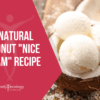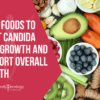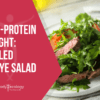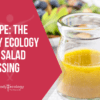Sunny Do or Sunny Don’t: Your How-To Guide for Enjoying the Summer Sun
 Stop Slathering on that commercial SPF 45, and soak in the Vitamin D and healthy beauty the sun has to offer you.
Stop Slathering on that commercial SPF 45, and soak in the Vitamin D and healthy beauty the sun has to offer you.
Family picnics, days at the beach, camping trips — oh what the great outdoors has in store for you this season! Summer has officially arrived and so have two familiar questions: How will I protect myself (or my children) from the sun? And, what kind of sunblock should I use?
Well, here at Body Ecology, we strive to educate you on how to be safe all year round, and create the immunity that protects you against many types of environmental damage.
But the sun, that big magnificent ball of energy in our sky, provides you much more goodness than you might know. Of course, you will want to avoid getting too much sun, but you do need adequate amounts of sun this summer to be healthy all year long.
Your goal should be to prepare your body to absorb the sun’s benefits while preventing damage from too much sun and sunburns. Read on and learn how to do just this.
The Sun is Your Best Bet for Getting Ample Amounts of Vitamin D
When you’re ready to enjoy the summer sun this year, forget the commercial sunscreens. There are other, natural remedies that will allow maximum sun protection, and won’t harm your skin or the environment. Mainstream sunscreens contain harmful chemicals and additives that do more than block the sun; they have been shown to accelerate cancer development, and prohibit Vitamin D production.
How Important is Vitamin D?
Vitamin D is known to impact the function and development of at least 36 different organ tissues, and influences over 2,000 genes in your body. This “vitamin” (Vitamin D is actually a hormone) is responsible for letting your cells know when to die, so new and healthy ones can replace them. This is one way that Vitamin D helps prevent cancer. Cancerous cells are cells that grow and live beyond their expiration date.
Here are some other interesting Vitamin D facts:
- Vitamin D is so important to your health that Nature gave us a way to make it in our skin.
- After your skin absorbs the sunrays you make Vitamin D from the cholesterol in your body. (Another example of why having healthy cholesterol levels is important).
- Adequate amounts of Vitamin D are difficult to obtain from diet alone.
- Vitamin D made in our skin lasts longer in our body than Vitamin D taken from a supplement.
- Adequate time in the sun during the summer months should ideally provide enough Vitamin D to take us thru the dark winter months until spring (and sunlight) comes again.
- Vitamin D deficiency is suspected to be the #1 cause of juvenile diabetes.
- Vitamin D increases your body’s ability to absorb calcium by 40%, which is critical to healthy bones and teeth.
- Vitamin D helps your body produce cathelicidin, a broad-spectrum antibiotic.
- Vitamin D is best taken with your biggest meal of the day according to recent research from the Cleveland Clinic.
- Vitamin D is a fat-soluble vitamin. We recommend you eat it along with other Vitamin D rich fats (butter, ghee, egg yolks and fish oil) to help with the absorption at your largest meal of the day.
Why is Sunscreen Hazardous?
Many popular sunscreens contain super-high amounts of Vitamin A. Ironically, the higher the SPF (Sun Protection Factor) rating, the more oxybenzene (a chemical that interferes with hormone production) you’re putting on, and the more you’re hindering Vitamin D production.
Sunscreen is also harmful for the environment. Each year, scientists estimate that between 4000 and 6000 metric tons of sunscreen are washed into the ocean by swimmers and beach-goers. This puts 10% of the world’s coral population at risk, and is thought to be the number one cause of the bleached coral skeletons that are becoming more commonplace today.
Go Ahead: Play in the Sun…But Be Sensible!
There are a number of easy and healthy ways to protect your skin from the potentially harmful effects of the sun besides remaining inside your office, or covering up with jeans and a turtleneck.
If you are someone who has been persuaded to avoid the dangerous ultraviolet sunlight and are afraid to expose yourself to our sun’s deliciously warming rays, it may simply take courage to give the sun a second chance.
But timing is key
Go out between the hours of noon and 2:00 pm for 20 – 30 minutes 3 times per week. This is the recommended amount for “sensible” sun exposure recommended by Dr Michael Holick, author of a new book, The Vitamin D Solution: A 3 –Step Strategy to Cure Our Most common Health Problem.
Dr Holick has devoted over 3 years of his life to the study of Vitamin D and as a graduate student at the University of Wisconsin was responsible for isolating and identifying the major circulating form of Vitamin D in humans as well as the active form produced by the kidneys. These discoveries lead to the use of Vitamin D as a supplement.
Why Bother When I Can Just Take a Pill?
Here are 3 great reasons:
- Vitamin D from the sun is natural.
- You can’t overdose on Vitamin D made in your skin.
- Vitamin D made in your skin lasts at least twice as long as Vitamin D from a supplement.
Probiotic Foods are Your First Defense
Of course, over-indulgence of the sun’s rays can lead to painful sun burns — so don’t overindulge. After the appropriate amount of sun exposure simply cover up your skin with a healthy sunscreen.
With high levels of Vitamin D circulating in your blood you are less likely to burn. Yes, you read that correctly. You are less likely to become sunburned if your Vitamin D levels are at a high normal of between 50 – 80 nanograms per milliliter.
You are less likely to become sunburned when you eat healthy fats and oils so that your body makes healthy cholesterol. Transfats and refined, bleached and deodorized oils are partially responsible for our overly sensitive reaction to the sun and to skin cancer.
You are less likely to become sunburned if your immune system is strong. That’s why it’s important to protect against sun damage by increasing your intake of immune-boosting probiotic foods. The beneficial microflora in fermented, probiotic foods strengthen your immune system and therefore your body’s natural protection against sun damage.
Believe it or not, by simply eating a balanced Body Ecology Probiotic diet that suits your nutritional needs, you actually increase your absorption of Vitamin D from your Vitamin D-rich foods as well.
Planning a Full Day in the Sun? Think Essential Oils
Sometimes it’s just too tempting to stay outside and soak in the fun. So, here are some natural sunburn prevention tips for you.
You will notice that we recommend essential oils for sun protection. These are very potent natural solutions, and you will love how they make you smell and feel.
- Purchase a bottle of zinc oxide ointment from your local health food store, and mix that with your favorite lotion, and you just made a natural sunscreen. The zinc oxide protects you from the same harmful rays as titanium dioxide (found in many sunscreens), without harm to the ocean or your body.
- If you’re in a pinch, and want to protect yourself, applying a layer of coconut or jojoba oil will provide minor protection (equivalent to about and 8 or 10 SPF rating)
- Blend a few drops of lavender, frankincense, or sandalwood essential oils with coconut or jojoba oil for added protection and moisture
- For ultimate protection, blend 4 drops each of geranium, lavender, and carrot seed oils with 1 tablespoon of your favorite lotion or other medium, and apply hourly or when leaving the water
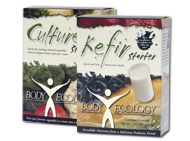 Make your own coconut water or raw milk kefir and help b
Make your own coconut water or raw milk kefir and help b
Spending time in the sun is not only beneficial, it’s necessary. Spending time outside everyday and enjoying the heat (and sweating to eliminate those toxins) is great for your body and your spirit.
Take care of yourself (and your family), by practicing “sensible sun exposure” and increasing your body’s natural ability to fight osteoporosis, heart disease, autoimmune diseases, depression, arthritis, diabetes, chronic pain, psoriasis, fibromyalgia, autism and cancer.
RESOURCES
- Artemis, Nadine. “Interview with Nadine Artemis.” Interview. Audio blog post. Raw Divas. Web. 18 June 2010. http://attendthisevent.com/?eventid=13085445.
- Kerr, Jennifer C. “Sunscreen Labeling Changes Coming, but Not in Time for Summer – PressofAtlanticCity.com.” PressofAtlanticCity.com: Home – Breaking News plus Local, Business, Sports, Entertainment & Video News for Southern New Jersey. Web. 18 June 2010. http://www.pressofatlanticcity.com/life/article_2df6e8af-480e-5c44-995b-6a93d165f5d7.html.
- Nanoparticles and Nano-ingredients in Sunscreens | Viva Woman.” Web log post. Viva Woman: Singapore Asian Organic Skin Care Beauty & Fashion Blog. Web. 18 June 2010. http://www.vivawoman.net/2008/11/11/does-your-sunscreen-contain-nanoparticles/.
- Study: Many Sunscreens May Be Accelerating Cancer.” Breaking News & Analysis, US, World, Sports, Celebrity & Weird News. Web. 18 June 2010. http://www.aolnews.com/health/article/study-many-sunscreens-may-be-accelerating-cancer/19488158.
- Vitamin D. Rep. Thorne Research, Inc., June 2008. Web. 15 June 2010. http://www.thorne.com/altmedrev/.fulltext/13/2/153.pdf.

